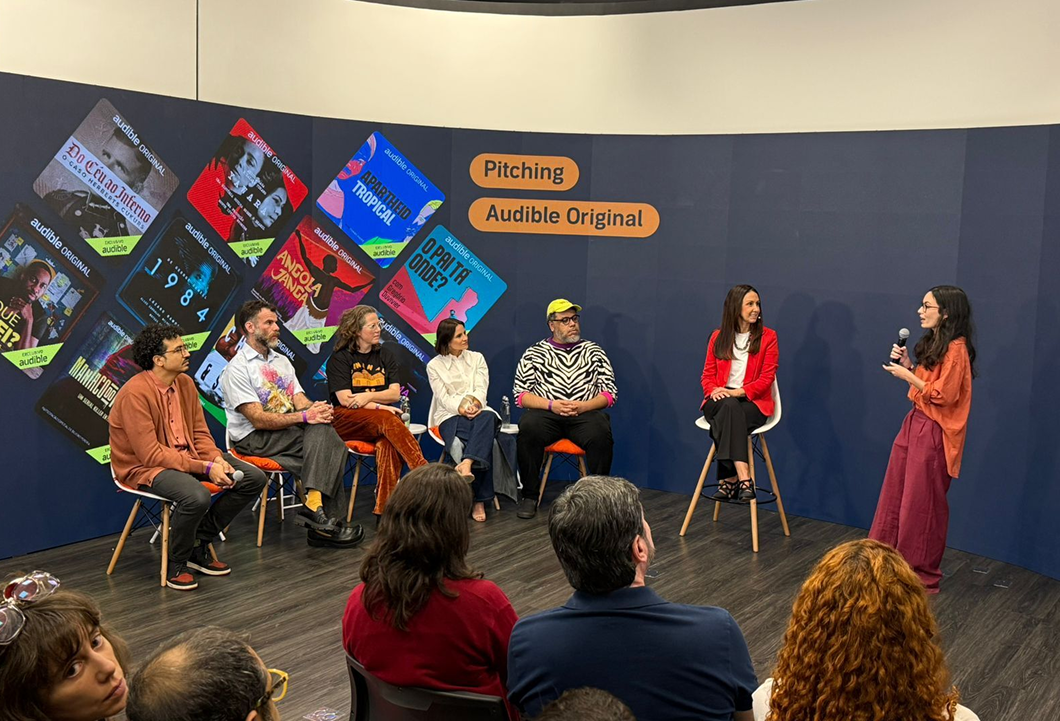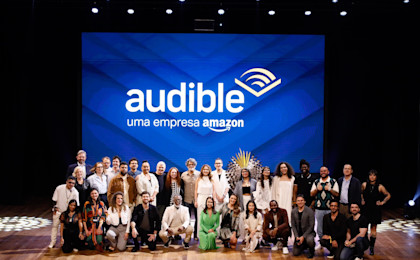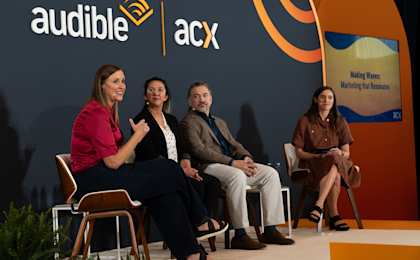Audible Initiative Opens Doors for Brazil’s Emerging Storytellers

A rideshare driver in the Brazilian city of Goiânia finds himself involved in a police investigation after dropping off a female passenger who was later found murdered. As he continues driving around the city, new pieces of the mystery emerge, casting doubt on his version of events. This is the plot of Qual o Destino? (What’s the Destination?), the thriller that was picked from more than 200 entries to win “Pitching: Audible Original,” an initiative launched by Audible to give emerging Brazilian creators the chance to work with us to produce an audio series.
“The first thing I thought about when writing Qual o Destino? was how to use the full potential of sound and how to innovate within the format,” explains Mikaela Pasa who, with her collaborator Lorrana Flores, created the pitch. Pasa’s love of audio storytelling runs deep — it was the focus of her Master’s degree, and she’d long wanted to create an audio series but felt she lacked opportunities. When she heard about Audible’s call to pitch an original audio story for production, she and Flores jumped at the chance.
“I was already familiar with Audible,” Pasa says. “It’s become the benchmark for audio stories, so I knew this was a chance not only to get the project funded but to have it distributed to a wide audience.”
Leo Neumann, Audible's director of original content for Brazil, notes that while Brazil has one of the highest percentages of podcast listeners in the world, scripted audio remains a nascent market. “There aren’t many production companies (here) specializing in it, but Audible is heavily invested in premium Brazilian scripted audio storytelling."
Audible designed “Pitching: Audible Original” to encourage pitches from independent creators who might not have the same access that production companies enjoy. “We focused less on resumes and more on why creators felt they had to tell this story, and why now,” Neumann explains.
The team also aimed to reach creators from across Brazil, not just major media hubs like São Paulo and Rio de Janeiro. Pasa and Flores are from Goiás, a state often underrepresented in entertainment. “When people from Goiás are shown, there’s usually a lot of stereotyping,” says Neumann, explaining that the state’s population is often depicted as rural, when in fact most people live in urban areas. Pasa agrees: “Lorrana and I are used to seeing stories from our region appropriated by outsiders, often without the care to portray our lived experience.”
That’s why it was important to the pair to set Qual o Destino? in their home city of Goiânia. “We thought about how the city’s sounds could shape the plot,” says Pasa. “Goiânia influenced us the most.” She adds that Audible “always respected our experiences and encouraged us to bring our accents, customs and realities into the story.”
As female creators, Pasa and Flores also wanted to address femicide. “In Goiás, robbery and homicide rates have decreased, leading many to call it one of the safest states in the country. However, the femicide rate remains a concerning issue, which made us ask ourselves, ‘Who is this state really safe for?’”
Qual o Destino? was chosen for being especially audio-driven, with a narrative unfolding through conversations and the podcasts and radio programs the driver, Jorge, listens to. Pasa was one of six finalists invited to pitch in person to a panel including Neumann and several prominent Brazilian creators who’ve worked with Audible, including writer and podcaster Chico Felitti; creative director of Rádio Novelo Paula Scarpin; actress, producer and director Bianca Comparato; and MM Izidoro, a screenwriter, author and director who adapted the comic Angola Janga for Audible with Viola Davis’s Ashé Audio Ventures. “I was honored to be involved,” Izidoro says. “One of our main jobs as veterans of Brazil’s young audio industry is to help new voices and talents.”
Izidoro “fell in love” with audio storytelling because it’s a format that’s easily accessible to all. “I can bring a diverse group of people to a production because they’re the best voices for those parts,” he says. “That lets me put minority voices in lead roles they wouldn’t often get in visual media.”
To further encourage and guide new creators, Audible offered a free 30-episode masterclass, Criando um Audible Original (Creating an Audible Original), covering every aspect of audio narrative production, from writing and performance to sound design. Izidoro contributed to an episode on directing actors for audio drama. “I learned by doing, but it took years,” he says. “If I can help people speed up that learning and make better audio content, that’s a win.”
The final pitches took place on May 20 in São Paulo at Brazil’s renowned communications institution, ESPM-SP, which broadcast the event live and hosted audio storytelling panels for students with Neumann and the judges. When Pasa learned she and Flores had won, she was euphoric. “I sent Lorrana an audio message thanking her and telling her we weren’t crazy, that it had all worked out. It felt surreal.”
Now Audible is working with Pasa and Flores to develop Qual o Destino? for listeners in Brazil. “It was reassuring to realize we wouldn’t be alone, as Audible has assembled an excellent team to be part of the production process.” For Pasa, the win feels like the start of an exciting career. “I plan to invest in more audio projects, since Qual o Destino? will give me visibility and let me explore paths I haven’t had access to yet.”


